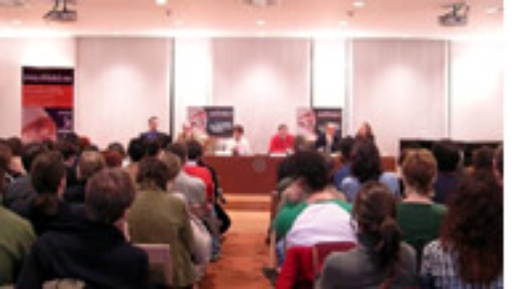Europe: Adapt or Die
Published on
Translation by:
 caroline reid
caroline reid
The Madrid Coffee Storming, attended by 110 people and 4 guests of honour on the 12th of February, provoked an unfinished debate about European Foreign Policy under the new Constitution
 At the Residencia de Estudiantes – one of the most important European intellectual debate forums of the inter-war period – café babel has once again stirred up controversy.
At the Residencia de Estudiantes – one of the most important European intellectual debate forums of the inter-war period – café babel has once again stirred up controversy.
Experts who don’t agree
Nobody would dispute that “Europe is trying to have a voice of its own in a world in which the international reality is constantly changing”, says Enrique Viguera, the Director General for EU affairs at the Spanish Foreign Affairs Ministry. He then adds “we must constantly consider adapting in view of the emergence of new world powers, such as China, India or Brazil”. Of all the speakers, Professor Carlos Taibo of Complutense University was the most critical, both of the European Constitution as well as EU foreign policy. He doesn’t believe that the EU member countries who supported the Iraq war against NATO recommendations will decide to respect international law from now on. “If the EU itself were to request entry into the European Union today, it would be refused on the grounds of being undemocratic” Taibo declared, in a somewhat sensationalist statement. From the public, Fernando Navarro of café babel argued that “perhaps this will change following the appointment of an EU Foreign Minister”, a position that Enrique Viguera considers “a fundamental step forwards…with the aim of avoiding the absurd situation of having 25 different European embassies in any one country and which will also bring about the beginnings of a future diplomatic corps”. “It is a question of efficiency”, he stated.
Ambiguity is the order of the day
Carlos Taibo was not in agreement. He firmly believes that the ambiguity of the Constitutional Treaty raises more concerns than it deals with, citing the examples that the abolition of the death penalty would not be total and that there is ambiguity surrounding the interpretation of the concept of “preventative attacks”. “If they hadn’t wanted the format to be so ambiguous, they should have designed it differently”, he argued, continuing “When Israel or Russia breaks the rules, our governments look the other way”. This opinion was supported by the public, with one attendee highlighting the cynicism and “double language” of European culture: “Europe has not always acted according to what was written on paper”. “Exactly”, notes Fernando Navarro, “the 1957 Treaty barely mentioned peace in debates over ‘the market’, yet peace has been Europe’s most significant achievement”.
The desire to improve
However, having reviewed the practical advantages that European citizenship will offer abroad (such as the possibility for European citizens to go into any other member state’s Embassy for help abroad), Cecilia Orellana, a top table guest and President of a European NGO, is optimistic. She pointed out that the Constitution also has “other positive obligations in terms of foreign policy, such as the defence of Human Rights and co-operation in development and humanitarian aid”. But a member of the public, Elsa Aimé, objected stating “the European Union carries out coercive humanitarian diplomacy, especially in Africa”.
José Ángel Sotillo, also an international relations expert and the Director of the Complutense University Institute of Co-operation and Development, was the last of the speakers to participate. He was very blunt about the European Community: “With this European Constitution the opportunity to create a European Union which actually lives up to this name has been missed. This Constitution has been created in terms of what the governments want, and without considering the citizens”. He also raised a very important point for discussion: “Why hasn’t there been a European referendum?”. Even so, Sotillo, who describes himself as strongly pro-European, concludes: “I believe that we should vote yes to the Constitution, and then attempt to improve it”.
Translated from Europa: readaptación o muerte


